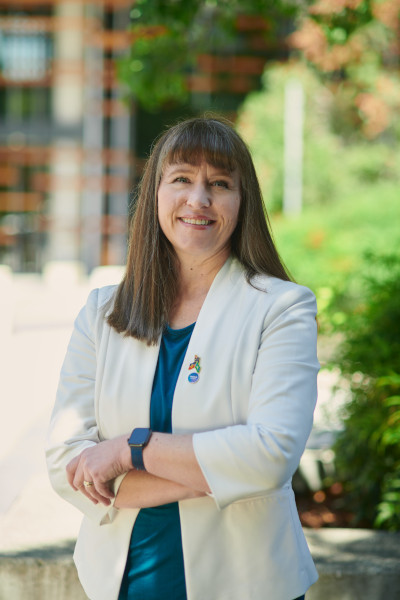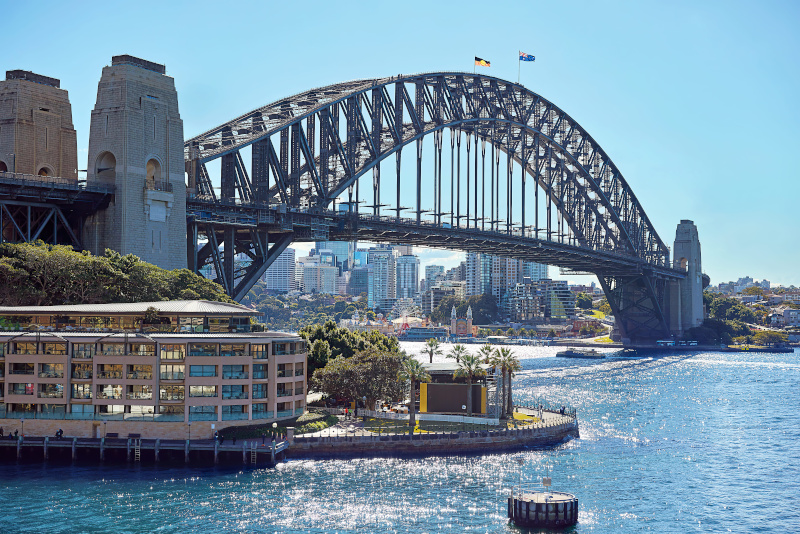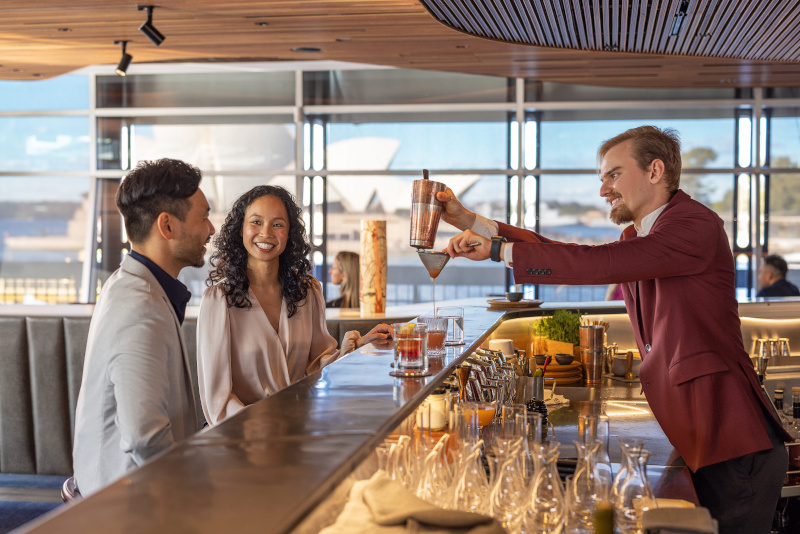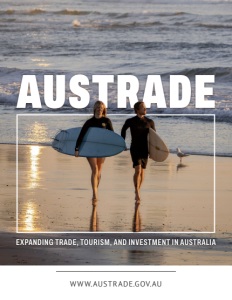Austrade (The Australian Trade and Investment Commission)
Expanding Trade, Tourism, and Investment in Australia
Showcasing Australia to the world through its products and services
Austrade, the Australian Trade and Investment Commission, is Australia’s primary agency for promoting international trade and attracting investment. Sam Palmer, General Manager of Visitor Economy and Client Programs at Austrade, explains that the commission is fundamental in showcasing Australia’s products and services to the global market, facilitating foreign investment, to create more and higher paying jobs for Australians. Austrade’s multifaceted approach reinforces Australia’s economy, particularly in tourism and trade, with strategies Palmer and her team have spearheaded to maintain and grow Australia’s international presence.
Expanding Australia’s global footprint

Sam Palmer, General Manager of Visitor Economy and Client Programs at Austrade
Austrade operates with a broad mandate, focusing on selling Australia to the world and attracting investments. Palmer emphasizes that Austrade promotes “the amazing products and services that Australia has to offer” while fostering international investment opportunities for Australian businesses. “We work hard to attract productive foreign direct investment and contribute to the Government’s future made in Australia agenda,” Palmer explains.
The agency also has a Commonwealth responsibility for tourism policy, a role that dovetails with its broader trade and investment functions. In collaboration with its sister agency, Tourism Australia, Austrade is responsible for making Australia a top business and leisure travel destination. Tourism Australia focuses on creating demand and marketing the country as a holiday and business destination. At the same time, Austrade concentrates on the supply side, ensuring that industry capability and strategy align with national and international goals.
Austrade’s reach extends even further, promoting Australia as a destination for international education. “We have an exciting range of functions,” Palmer says, highlighting how its work spans various sectors.
Setting priorities for trade and investment
Austrade’s strategic priorities align closely with the Australian government’s broader policy directions. For instance, the Southeast Asia Economic Strategy to 2040, authored by Nicholas Moore AO, outlines the importance of fostering stronger trade relationships with Australia’s neighbors, particularly considering Southeast Asia’s growing middle class and rapid economic development. Palmer explains, “The government has set a priority to capitalize on opportunities with our neighbors,” emphasizing the importance of building trade relationships with rapidly growing regional markets.
Free trade agreements also play a role in Austrade’s work. The agreements help reduce trade barriers, making it easier for Australian businesses to enter international markets. According to Palmer, free trade agreements are designed to make global commerce more accessible. “When we look at trade and investment, we’re thinking about how we can shore up supply chains and support Australia’s goal of becoming a global energy superpower, all while meeting our carbon net zero commitments,” Palmer says.
Critical minerals are another area of focus for Australia, with the government recognizing the importance of these resources to Australia’s economic future. “The government has been very clear about the importance of Australia making the most of trade opportunities in critical minerals,” Palmer explains, pointing to the country’s rich deposits and the growing global demand for these materials, particularly in the clean energy sector.
Digital resources and global networks
To help Australian businesses expand internationally, Austrade provides various services. One of the agency’s most significant tools is the Go Global Toolkit, an online platform that offers companies access to updated market information, regulatory requirements, and additional resources. The toolkit is designed to be user-friendly, with plans to provide personalized services such as training and masterclasses. “We’re enhancing our digital offerings to make them as accessible and effective as possible for businesses,” Palmer notes.
Beyond digital resources, Austrade maintains a strong global presence. Nearly half of the agency’s staff is stationed overseas, working on the ground to facilitate trade connections, identify opportunities, and support Australian businesses looking to break into foreign markets. Palmer explains, “Our staff overseas play a huge role in connecting Australian businesses to new opportunities, organizing trade events, and helping businesses navigate the complexities of international markets.”
Austrade also runs several programs to build the tourism sector’s capabilities. These programs are designed to make tourism operators “export-ready,” meaning they are prepared to attract international visitors and meet global expectations.
In addition to capability-building initiatives, Austrade provides grants to industry bodies like the Australian Tourism Export Council to help businesses understand the needs of key markets such as Vietnam and Muslim-majority countries. The grants are essential for assisting businesses in tailoring their services to meet the demands of an increasingly diverse global tourist base.
THRIVE 2030 Strategy
While Austrade plays a significant role in Australia’s trade and investment strategies, Palmer primarily focuses on tourism. Through a collective effort, Austrade has developed a national strategy called THRIVE 2030, which aims to grow the country’s visitor economy by promoting sustainable and inclusive tourism. “THRIVE is an industry-led, government-enabled strategy,” Palmer explains. “It has actions that have been identified by the industry, the states, and the Commonwealth to ensure the sustainable growth of tourism.”
THRIVE 2030 targets $230 billion in tourism expenditure annually by 2030, reflecting the ambition of Australia’s tourism sector. The strategy centers on three core themes: collaboration, modernization, and diversification. “Tourism is a competitive environment,” Palmer notes, “and we need to collaborate strategically across the industry to maximize our resources.”
One of the key challenges facing Australia’s tourism sector is the need to diversify its visitor base. While major markets like China and Europe remain essential, Austrade is increasingly focusing on emerging markets closer to home. “It’s costly to get to Australia,” Palmer acknowledges, adding that Southeast Asia represents a key growth area. By focusing on geographically closer markets, Austrade aims to reduce the carbon impact of travel and make Australia more accessible to a broader range of international visitors.

Maximizing opportunities in tourism
The Australian tourism industry has faced several challenges recently, most notably the COVID-19 pandemic, which devastated international travel. However, as Palmer notes, the pandemic also presented an opportunity: “Australians got to fall in love with their own country again, as they couldn’t leave during COVID. This has been a silver lining for domestic tourism.”
Even as domestic tourism increases, the industry faces significant workforce challenges. “We have an aging population, and the demand for staff across the tourism sector continues to rise,” Palmer explains. Workforce shortages are a longstanding issue in Australia, exacerbated by the pandemic. Tourism is not alone in facing this challenge; industries like healthcare and education struggle to find enough staff to meet growing demand.
Another challenge has been the recovery of international air travel. While Australia now has the same number of flights as before the pandemic, passenger numbers have yet to recover fully, especially from key markets like China. “China was our biggest tourism market before COVID, but it was also the last country to reopen, so it’s taking time for numbers to build back up,” Palmer explains. In contrast, other markets, like Vietnam, have bounced back much more quickly, with Vietnamese travel to Australia exceeding pre-pandemic levels by 135%.
Sustainability and social responsibility
A core tenet of Austrade’s tourism strategy is sustainability, which focuses on environmental, economic, and social impacts. Sustainability isn’t just about the environment, Palmer emphasizes: “It’s about thinking about the total managed approach—sustainability across all pillars, from environmental to community engagement.” Austrade has developed a sustainability toolkit to help businesses reduce their environmental footprint and engage positively with their communities.
Part of Austrade’s focus on sustainability involves helping businesses understand the growing expectations of international travelers. For example, European business travelers are increasingly required to report their carbon use, meaning that tourism operators in Australia must be prepared to provide data on their environmental impact. “If we want to attract high-value travelers from Europe, we need to be able to answer questions about our carbon impact,” Palmer says, highlighting the importance of sustainability in maintaining Australia’s competitive edge.

Inclusive tourism
A key area of focus for Austrade is improving accessibility, especially as the 2032 Olympic and Paralympic Games in Queensland approach. The agency is collaborating with businesses to enhance access for travelers with disabilities. Palmer underscores the significance of this initiative: “We want to make sure that tourism in Australia is accessible to everyone.” Recent data from Tourism Research Australia reveals that in 2023, 23% of domestic trips involved travelers with long-term health conditions or disabilities, accounting for 21% of total tourism expenditure.
Palmer emphasizes that inclusiveness in tourism doesn’t have to come with a hefty price tag. “It’s not all about ramps and fixing stairs,” she explains, noting that even minor adjustments—such as accommodating food allergies or considering neurodiversity—can significantly impact. “Many disabilities are invisible, but that doesn’t mean they aren’t important. Making tourism more inclusive is good for everyone—it’s not just about meeting legal requirements but creating a better experience for all travelers.”
Strategic priorities for 2024
As Austrade looks to the future, community involvement remains central to its sustainability efforts. By addressing the challenges of over-tourism in other parts of the world, the agency aims to foster strong relationships between tourists and residents, ensuring that tourism brings mutual benefits. “The visitor experience needs to be great from start to finish,” Palmer emphasizes. “That means not just on the tour or at the hotel, but also when travelers interact with the community.” Through its toolkit, Austrade equips tourism operators with strategies that actively engage local communities, creating a tourism model where everyone flourishes.
Looking ahead to 2024 and beyond, Austrade’s strategic priorities align closely with the THRIVE 2030 strategy. Focusing on building upon Australia’s tourism sector’s remarkable growth in recent years, the agency is well-positioned to maintain its momentum.
Initially, the goal was to return to pre-COVID levels of tourism expenditure by the end of 2024, but Australia reached this milestone in 2023. “It was helped along by inflation, but the increased activity in the sector played a huge role,” Palmer reflects. This success is a testament to the industry’s resilience and Austrade’s commitment to fostering sustainable, inclusive growth.
AT A GLANCE
Austrade (The Australian Trade and Investment Commission)
What: A government agency that promotes international trade, investment, and tourism for Australia.
Where: Headquartered in Canberra, Australia. It also has offices across major Australian cities and operates internationally through a global network of offices in key markets.
Website: https://www.austrade.gov.au/




 This information will never be shared to third parties
This information will never be shared to third parties